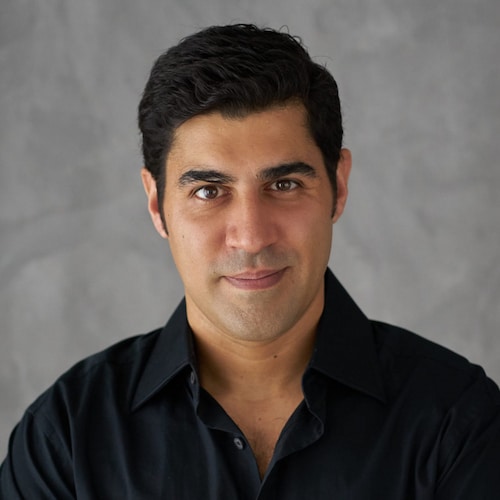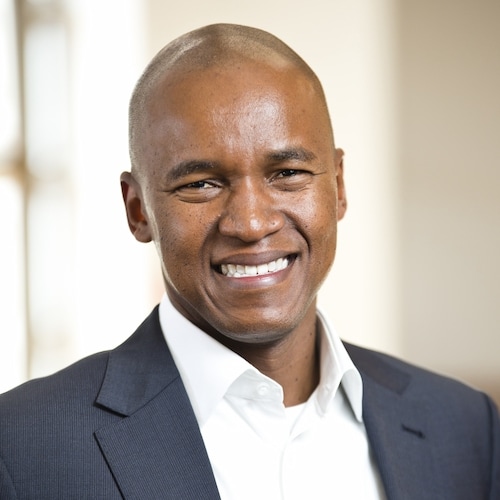{{item.title}}
{{item.text}}

{{item.text}}
Take on Tomorrow, the award-winning podcast from our management publication strategy+business, brings you Episode 11: “How should business adapt to support a world on the move?”
We live in an increasingly mobile world, with information, goods, and services moving around the globe faster than ever before. Countries that are welcoming young and talented people look set to benefit, but migration could have a negative impact on the countries left behind. Can business help to create a more circular flow of people and skills? In this episode, we discuss how mobility could be a solution to some of the challenges we face, the current trends shaping migration and their historical precedents, and what business should do to attract migrating talent.
Lizzie O’Leary
Podcaster and journalist
Ayesha Hazarika
Columnist and former senior political advisor
Parag Khanna
Author and entrepreneur
Dion Shango
Territory Senior Partner
PwC Africa Central and Southern Africa
2023 Shorty award winner for "Best Branded Podcast" series
2023 Webby award nominee for "Best Podcast" series
{{item.text}}

{{item.text}}
As reinvention pressure rises, CEOs need to rewire their decision-making.
Sharp, actionable insights curated to help global leaders build trust and deliver sustained outcomes. Explore our latest content on the global issues affecting organisations today from ESG to value creation, technology and cyber to workforce transformation.
Parag Khanna: The story of human migration is as old as humanity itself. And the drivers would certainly have been originally climate. But then, of course, there’s been political violence, the search for economic opportunity, the world wars, genocides, demographic imbalances, labour market shortages.
Dion Shango: If we are to help change and develop African countries, then everybody needs to contribute. The role that cannot be emphasized enough is the role by business—business being ultimately the providers of capital. That is where the magic happens.
Parag: I would say, if you’re a country that’s attracting young people, you’re gonna be fine. You’re gonna have taxpayers, innovators, entrepreneurs, homeowners, renters, construction workers. You’re going to have those things, and, if you’re losing people, you’re not going to have those things.
Lizzie O’Leary: From PwC’s management publication strategy and business, this is Take on Tomorrow, the podcast that brings together experts from around the globe to figure out what business could and should be doing to tackle some of the biggest issues we face.
I’m Lizzie O’Leary, a podcaster and journalist in New York.
Ayesha Hazarika: And I’m Ayesha Hazarika, a broadcaster and former senior political advisor in London.
Lizzie: Today, we’re talking about global mobility. We live in a world where migration flows are increasing. While some are forced to move—by war, poverty, or climate change—others choose to move. With greater mobility becoming the new normal, how should business respond?
Ayesha: How can economies suffering the effects of the brain drain attract skilled workers to come home? And can businesses help create a more circular flow of people and skills across the globe? Could mobility be a solution to some of the challenges we face?
Lizzie: To answer those questions and explore some of the current trends shaping migration, we talk to Parag Khanna, who you heard at the start. Parag’s an entrepreneur and author of the book Move.
Ayesha: But first, we’re joined by PwC’s Dion Shango, territory senior partner for Africa Central and Southern Africa. Dion, welcome to the show.
Dion: Thank you very much, Ayesha. It’s a pleasure to be with you and Lizzie.
Lizzie: Dion, as we talk about and contemplate an increasingly mobile future, what are your clients telling you are their greatest concerns?
Dion: We are hearing quite a number of concerns from our clients. Our clients are telling us that, increasingly, they’re finding it more challenging to find people who have the type of skills that are incredibly difficult to teach and not easily automated. Creativity, innovation, emotional intelligence, as well as the ability to work in teams. There is a bit of a contradiction, though, in many of our markets in Africa, in the sense that we do see high unemployment, particularly amongst the youth in many of our countries. And so, on the one hand, the African continent is blessed with a demographic dividend, but on the other, these millions of people who could be so productive to their economies do not appear to possess, at the moment at least, the type of skills, knowledge, and attributes that make them highly attractive in the employment market.
Ayesha: Dion, you’ve just raised some really important issues there, but we’ll come back to you on the role that business can play in a moment. But, Lizzie, you spoke to Parag Khanna, author of Move. Tell us what his book is about.
Lizzie: It’s a book about the future of global mobility and explores the main forces that have shaped the movement of humanity across the globe, both past and present. And it looks at a number of scenarios for a more mobile future. But I began by asking Parag whether there’s a substantial difference between the historical drivers of migration and the reasons people move today.
Parag: The story of human migration is as old as humanity itself. And the drivers would certainly have been originally climate, right? The search for a stable habitat in the absence of modern heating and air-conditioning. But then, of course, there’s been political violence, the search for economic opportunity, the world wars, genocides, demographic imbalances, labour market shortages—all of these factors have been, you know, key drivers of migration, but in different volumes and different times.
Today, in the 21st century, we’re seeing all of those factors in play simultaneously. We have seven or eight raging conflicts around the world that are simultaneously the origin of at least a million refugees or asylum seekers.
And then, of course, you’ve got the labour imbalances. There’s never been a greater gap between old and young, within countries and across them. And then you have technological disruption, of course, people being displaced as factories close, jobs are outsourced, and so on. And then, climate change is back with a vengeance, right?
In the last two decades, according to the International Organization for Migration, a third of the total displaced people in this young century that we’re in are accounted for by climate change. So now you’ve got kind of one-third political, one-third economic, one-third climate, and that’s where we are today.
Lizzie: And, I wonder, when you look at these different kinds of migration, who are the people who we’re talking about here? And do you think those different kinds of people matter when we think about this holistically?
Parag: It does. Let me give two answers. We have a world population of 8 billion people, and we might say that 4 billion of them are either geographically isolated, or too poor, or old, or infirm, are politically unable. So, now I’m talking about the other 4 billion. The majority of them are young, the majority of them are in Asia or are in developing countries: Africa, Middle East, and so forth.
So, I, in particular, therefore look at the mobility of young people from the developing world. When we think about who’s going to fill our labour shortages, even as we also have 150 million young people in the United States, it’s still not enough. So there is going to be mass migration on the basis of just the economic demand and labour shortages alone, to say nothing of the climate crisis and political violence and other drivers.
Lizzie: If you’re sitting in a C-suite, what should you be thinking about to help those people become a part of your workforce and encourage that mobility?
Parag: So, if you are company X operating in markets A, B, C, D, E, F, you want to think about: what is it that you’re doing in those geographies? What’s the workforce that you need? What skills do they need to have? Are the local educational institutions sufficient? What’s the contingency plan if the country falls apart for geopolitical reasons or if there’s a power crisis, a climate crisis, whatever the case may be? So the geography of your workforce, the connectivity of your workforce, the skills of your workforce are all things that you, yourself, actually have to think about.
Lizzie: When you think about globalization, what’s not working right now and how can businesses make it work better?
Parag: So, what we’re learning is to de-concentrate. We’re learning that we should have no single point of failure, that we should distribute supply chains. We learned that during COVID-19 with PPE, with medical equipment, right?
Lizzie: Definitely.
Parag: So whether it’s vaccines and medical equipment, whether it’s semiconductors, really rare earth minerals, for any critical component or commodity, you should always have redundant capacity. Just-in-time supply chains and so forth are not the best model for a very brittle kind of world. Because the more complex the world becomes, the higher the likelihood that there is going to be a disruption where you didn’t read the signals well enough, far enough in advance. So what’s happening in practice is that we are moving towards a world where manufacturing is distributed across ten major locations rather than just two or three. And that’s going to be a very important part of overall systemic resilience.
Lizzie: When we talk about these kind of big realignments, we are kind of, by definition, talking about winners and losers. The fear I have is that some people are going to get left behind when companies are trying to attract global skilled labour. How do you think about that?
Parag: What we need to do is expand connectivity, expand opportunity, so that fewer people are left behind. And that’s done through investments in infrastructure, in education, in digitization, supply chains, markets, all of those things that public and private investment have brought about. Now, there is an opportunity, especially given, again, labour shortages everywhere, to focus on optimizing human capacity and human capital, and really bringing people up to the level that they could be at to be more productive economic agents and citizens.
Lizzie: How do you square the emergence of populist governments, particularly in the West, who have pushed, you know, really strong anti-immigration policies? And, if you are a multinational business, what do you do with that? Because that makes things hard.
Parag: Talent shortages have definitely affected productivity and innovation in Western firms, and that’s why they have been among the chief advocates for more open immigration, for immigration reform, for H-1B visas, and all of those kinds of mechanisms. But to be clear on the political side, the story should not lead with the rise of populist governments that are anti-immigration. The story is the rise of immigration and the fact that most governments, most of the time, are as or more open to immigration, with rising volumes of immigration, than we have witnessed in a very long time. That’s the real story. I cannot allow social media negativity to color or discolor the reality on the ground, which is that even after Brexit, you’ve basically moved towards an even more liberal status quo ante. It’s easier to move to the United Kingdom today than it was before Brexit.
So the facts are what we should lead with, which is that the most significant, largest, most economically weighty economies of the entire Western world have literally never had a larger foreign population than they have today.
And America has lived and learned the hard way; Britain has lived and learned the hard way. But the bottom line is we always come back to supply and demand driving the movement of people. That’s how we got to where we are, and that’s going to drive where we’re going.
Lizzie: So, if you are a multinational corporation and you still have to negotiate or think about refugees who could become part of your workforce, how do you position yourself?
Parag: Well, this is a great story. If you look at, you know, Germany, over the last seven years since the Syrian refugee crisis; Germany has absorbed waves of migrants, and that’s why it’s the only major European economy with a growing labour force. You can now arrive in Germany as an asylum seeker, and within maybe like four years, five years, you’re already applying for citizenship.
So, it’s pretty amazing, what’s happened there. And if it can happen there, it can certainly happen in other countries too. In a world stressed by climate change, disruptions of all kinds, labour automation, geopolitical tension, conflict, all of it, it boils down to one simple predictor of success and failure. I would say, if you’re a country that’s attracting young people, you’re gonna be fine. You’re gonna have taxpayers, innovators, entrepreneurs, homeowners, renters, construction workers. You’re going to have those things. And, if you’re losing people, you’re not going to have those things.
Lizzie: What happens to the other side of that? The country where people leave? Or people who can’t leave? Do you worry about brain drain?
Parag: I do worry about brain drain, but it depends on the country of origin, because it’s a phenomenon that plays out quite differently. There are countries where there is brain drain and no remittances that are paid back and delivered to the economy to help to stimulate local economic growth and skill-building and investment.
But then, there are countries where there’s a lot of outflow of people and reduced friction on remitting capital to drive capital formation in the economy.
Then, there’s again, countries that are very small, and they’re losing people at an alarming rate, and then there’s really no one left, and insufficient support for the domestic tax base and investment, like Bulgaria. But then, there are countries like India, which is officially as of this year, the most populous country in the world.
So India can afford to, quote unquote, be brain-drained by millions of people every single year, and still have many, many, many people left in India to still build India. So, this generalization of brain drain actually winds up playing out very differently in different contexts.
Lizzie: Do you worry about people who move not being integrated into a new economy? You used the Germany example. I have spent time with Syrian refugees in Germany, and one of their biggest challenges was becoming really a part of that economy and not feeling sort of siloed and isolated.
Parag: Yes, of course, initially there might be communities where there’s mistrust, communities where it’s something, you know, viewed as something of a burden. But over time, again, a country that is politically stable, that realizes pragmatically that it needs to have more migrants, is going to act more and more the way the United States, you know, has done particularly in the 19th and 20th centuries. And that’s what we see many countries doing. And, again, if you don’t compete in that war for talent, the alternative is to be depopulating, to have labour shortages, a declining quality of life, a reduced tax base, lower competitiveness, and all of those things.
Lizzie: What do you want a business executive to take away from your work? What do you want them thinking about?
Parag: Well, knowledge, talent is at a premium, right? Ultimately, what you’re really competing for is skilled, talented, young people who are outgoing, who are hardworking, who are risk-taking or entrepreneurial, and who understand different cultures and geographies where you want to be selling, if you want to remain a successful global company in a very competitive world. So focusing laser-like, if you will, on young talent, wherever it may be, however it can be useful for you, in person, or remote, east, west, north, south. That’s what I think corporate management needs to be focused on when it comes to this issue.
Lizzie: Parag Khanna, thank you so much for talking with me.
Parag: My pleasure. Thank you.
Ayesha: Dion, what’s your reaction to the conversation we just heard?
Dion: Listening to the interview has just reminded me how critical it is to have more collaboration in order to really address this challenge of having sufficient productive capacity, sufficient employment capital in many parts of the world. I think there needs to be a concerted effort, starting really on a bilateral basis, of countries seeking opportunities and exploring ways of working together to try and match and marry the challenges to the opportunities.
Having said all of that, I think there is a specific obligation on developing countries to also get their houses in order. Africa, today, generally in most countries, you have this significant intergenerational gap. Between those that are tasked with leading those nations and those who form the vast majority of the populations of those countries.
And so, we need to see a generational shift of younger leaders, that are more in tune with the needs of the very young populations of the continent, and to be more proactive in grasping the opportunities of collaborating better with more developed countries. And finding ways in which this human capital—much younger human capital of African countries—can be deployed more effectively and in a way that is much more fair and equitable for Africa, to ensure that there are equal benefits for all countries.
Lizzie: In the part of the world you work in and overseas—-South Africa, and Africa more broadly—what are the reasons that those young workers are moving somewhere else?
Dion: Generally, the issues that we see that give rise to the brain drain are what I would call macroeconomic factors. If you take my own home country, South Africa, we are subject to rolling blackouts; electricity supply has to be rationed, and people have to do without power for a certain number of hours in the day. As you would expect, that results in a significant negative impact on business, particularly small businesses, and that just erodes confidence in the economy more broadly.
Another impact is that the way that the country is rated by the ratings agencies is that we are assigned a higher level of risk. What happens then is that our currency is downgraded, and so the rand–US dollar exchange rate weakens over time. And, again, that just takes away from the buying power of the man in the street. And so, these are some of the factors that then prompt a young person to say, “But, hang on, I have the type of skills that are marketable enough and useful enough to make me eligible to find work in another country,” be it the UK, the US, or another part of Europe.
Lizzie: I’d love to talk a little bit about climate change. I wonder if you see that starting to affect how young workers think about where they want to be in the future. If you’re in Senegal, if you’re in Côte d’Ivoire, in a country that is having, say, water issues, do you want to be somewhere else? And is that a place where business can identify, perhaps, opportunities to court these workers?
Dion: Without doubt, Lizzie. Again, all these issues, shortage of energy, shortage of power, do play a significant role in the decision-making of our young people.
Issues like climate change are critical for our future and how we define the role of young people in helping to address this particular risk to the continent. Again, if I reference a country like South Africa. We have a fairly large mining industry. You have whole towns that exist and operate on the back of coal mines that are adjacent to them or built near them. And so, on the one hand, everybody agrees that the world needs cleaner energy. But on the other hand, closing all of these coal mines will have a significant impact at a human level by virtue of all of the jobs that will be lost and taken away, and people effectively losing their livelihoods. And so, in this moral and ethical dilemma, business has a key role to play in defining how people that are dependent on these industries, such as coal mining, that are bad for the planet can be given the skills and tools to be able to contribute in other ways to the economy. This will require significant leadership from business.
Ayesha: Now, Dion, we’ve spoken a lot about migration out of Africa to Europe and elsewhere, but talk to us about what’s happening with migration within Africa.
Dion: I like that question in the sense that when I came into my existing role as senior partner for Central and Southern Africa some three and a half years ago, this was actually one of my key objectives to improve within our firm: to get people to move around consistently more than was the case at the time, and to work much closer together on a cross-border basis.
And that means physically uprooting people from their home countries and giving them the ability to work on projects in other countries that will have them actually be based in those countries for a good number of weeks or even months. I strongly believe that this type of cross-pollination of skills, knowledge, cultural experiences across the continent will be crucial for the growth and development of Africa, because historically, intra-Africa trade has been simply too low. So, without doubt, Ayesha, the movement and migration of people across the continent will be crucial for the growth and development of Africa.
Lizzie: When you talk about finding opportunity, whether it’s people moving within Africa or coming to Africa, where does the responsibility for making that happen lie? Does it lie with the political class? Does it lie with young people? Or does it lie with people who work for multinationals and can articulate a vision for being a welcoming hub?
Dion: The simple answer, Lizzie, in my view, is all of the above. And the reason why I say that is that young people in Africa are the same as young people anywhere else in the world. They want to know that if they apply themselves using their skills, their knowledge, their capabilities, that they will be fairly rewarded and recognized for that. They want to know that they are in an environment that makes it conducive to raise young families. And so, if we are to convert and help change and develop African countries to create those types of environments, then everybody needs to contribute. Without doubt, the political class will be crucial in terms of setting policy frameworks that make it easy for their countries to have people live in them. But, absolutely, the role that cannot be emphasized enough is the role by business—business being ultimately the providers of capital. That is where the magic happens.
Ayesha: Well, Dion, it’s been so interesting speaking with you and getting your expertise and your insights. Thank you so much for joining us.
Dion: Thank you very much, Ayesha and Lizzie. I thoroughly enjoyed the discussion.
Lizzie: That was really interesting, I am incredibly struck by this gap that Dion talked about between what workers want, what they’re clamoring for, and the political class and leaders and what they’re offering, and whether and how that can be bridged. Because, clearly, there’s so much opportunity.
Ayesha: I would agree with you, that was a fascinating episode and fascinating conversations. And, of course, we’re used to migration being pitched in quite a hostile way, quite a negative way; and it was actually really interesting to hear about migration, not just from Africa to Europe but also the importance of migration within the continent of Africa, and about Dion saying that, you know, more trade and more skills and more movement around Africa is going to be so important to the continent’s economic growth. I thought that was fascinating.
Lizzie: That’s it for this episode. Join us next week, when we’ll be asking: can capital help solve climate change?
Guest: Banks don’t deserve to exist unless they’re adding value and can add something to their customers. The question is: what can a bank do about that? Well, one of the most important things is we can finance the transition. We support millions of businesses and millions of customers who every day are making choices that will affect the planet, will affect climate.
Ayesha: Take on Tomorrow is brought to you by PwC’s strategy and business. PwC refers to the PwC network and/or one or more of its member firms, each of which is a separate legal entity.
© 2022 PwC. All rights reserved. PwC refers to the PwC network and/or one or more of its member firms, each of which is a separate legal entity. Please see www.pwc.com/structure for further details.
This content is for general information purposes only, and should not be used as a substitute for consultation with professional advisors.








